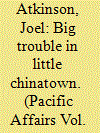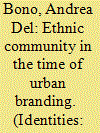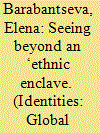| Srl | Item |
| 1 |
ID:
088721


|
|
|
|
|
| Publication |
2009.
|
| Summary/Abstract |
Taiwan's effort to carry on diplomatic relations in the face of hostility from China has collided with Australia's reform agenda for the Pacific Islands. This issue is particularly acute in Solomon Islands, which has longstanding ties with Taiwan and a close association with Australia. In the lead-up to the April 2006 elections in Solomon Islands, a local politician accused Taiwan of funding candidates. The same politician later stated that popular anger towards Taiwan sparked the post-election riot that devastated Honiara's Chinatown. Although neither of these accusations was supported with evidence, they prompted Australia to publicly criticize Taiwan's involvement in Solomon Islands. This article argues Australia's reaction was due to existing Australia-Taiwan tension over the South Pacific, and because Australian policymakers found Taiwan a more palatable focus than acknowledging the ambitious reach of Australia's reform efforts. Australia's rhetoric drew a negative reaction from Taiwan, which believed Canberra was seeking a scapegoat to deflect from its inability to anticipate or control the riot. The incident also contributed to the Taiwan government's perception of Australia as increasingly pro-China. Despite subsequent efforts from Taiwan and Solomon Islands to improve accountability for Taiwan's aid, the differing interests of Australia and Taiwan continued to be an issue as funding from Taiwan became more important to Solomon Islands Prime Minister Sogavare during his dispute with Australia. This article examines the interaction between Australia and Taiwan over Solomon Islands, and considers its significance to wider Australia-Taiwan involvement in the South Pacific.
|
|
|
|
|
|
|
|
|
|
|
|
|
|
|
|
| 2 |
ID:
192963


|
|
|
|
|
| Summary/Abstract |
The concentration of Chinese-owned businesses has been increasing in Ikebukuro, Tokyo. This study aims to analyse the extent to which local Chinese businesspeople are inclined to declare their presence as a solidified ethnic community in a metropolitan city. Drawing on the concepts of ‘ways of being’ and ‘ways of belonging’, the qualitative interview data suggest the unethnic characteristics of the ways of being in business practices. Chinese entrepreneurs embed their businesses into local institutions and markets, which may render ethnic ways of belonging, such as ethnic association activities and ethnic community-building, at odds with their interests according to their perceptions.
|
|
|
|
|
|
|
|
|
|
|
|
|
|
|
|
| 3 |
ID:
123204


|
|
|
| 4 |
ID:
176987


|
|
|
|
|
| Summary/Abstract |
This article proposes to look at the Chinese community as a contextual assemblage rather than an epistemic truth in discussing urban multiculturalism in the Sydney urban context. In doing so, it steers clear from the ‘groupist’ analytical framework for the study of ethnicity, and it rejects paradigms such as ‘the community’ as a collective distinguished by ‘a unique culture, held together by communitarian solidarity, and bound by shared identity’. A nuanced account of how the Chinese community becomes part of a system of value production is given, where acts of ‘consensus’ and ‘alignment’ are mobilised to embed its precarious formation within the branding strategies that aim to construct an ambiguous multi-Asian character for the precinct of Haymarket/Chinatown in the City of Sydney. These strategic positionings displace ethnicity understood as an essence, and the community as a taken for granted form of collective identification.
|
|
|
|
|
|
|
|
|
|
|
|
|
|
|
|
| 5 |
ID:
143645


|
|
|
|
|
| Summary/Abstract |
Research on Chinatowns stresses the spatial aspects of their production as communal urban spaces. This is particularly evident in the prevailing rhetoric of ethnic ‘enclaves’ that is common in the literature on Chinatowns. This article stresses the importance of taking into account the temporal dimensions of the examinations of space and migrants’ relationships with the city. The argument maintains that, although Manchester Chinatown incorporates many layers of time, only some of them are acknowledged. This view ties both space and people into a particular temporality that is associated with a predetermined culture and tradition. The article shows how relocation from Chinatown to a non-ethnically defined urban area makes it possible for community organisations to depart from the essentialised ethnic, cultural, and social associations produced through dominant understandings of migrant communal space.
|
|
|
|
|
|
|
|
|
|
|
|
|
|
|
|